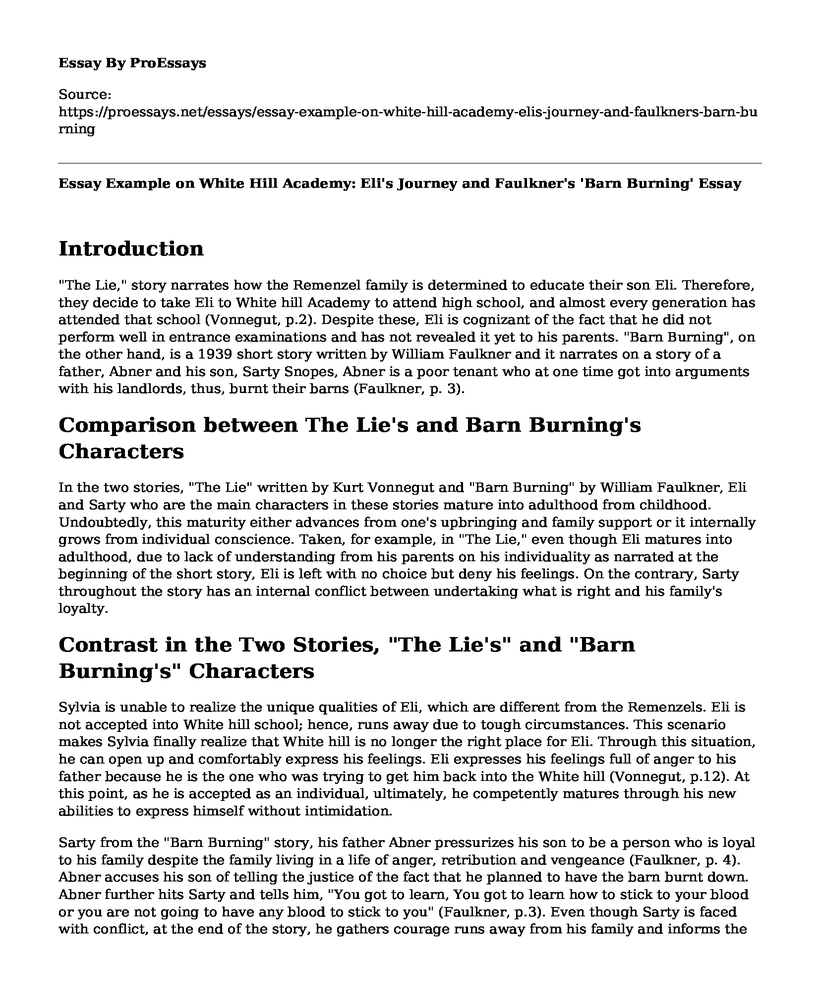Introduction
"The Lie," story narrates how the Remenzel family is determined to educate their son Eli. Therefore, they decide to take Eli to White hill Academy to attend high school, and almost every generation has attended that school (Vonnegut, p.2). Despite these, Eli is cognizant of the fact that he did not perform well in entrance examinations and has not revealed it yet to his parents. "Barn Burning", on the other hand, is a 1939 short story written by William Faulkner and it narrates on a story of a father, Abner and his son, Sarty Snopes, Abner is a poor tenant who at one time got into arguments with his landlords, thus, burnt their barns (Faulkner, p. 3).
Comparison between The Lie's and Barn Burning's Characters
In the two stories, "The Lie" written by Kurt Vonnegut and "Barn Burning" by William Faulkner, Eli and Sarty who are the main characters in these stories mature into adulthood from childhood. Undoubtedly, this maturity either advances from one's upbringing and family support or it internally grows from individual conscience. Taken, for example, in "The Lie," even though Eli matures into adulthood, due to lack of understanding from his parents on his individuality as narrated at the beginning of the short story, Eli is left with no choice but deny his feelings. On the contrary, Sarty throughout the story has an internal conflict between undertaking what is right and his family's loyalty.
Contrast in the Two Stories, "The Lie's" and "Barn Burning's" Characters
Sylvia is unable to realize the unique qualities of Eli, which are different from the Remenzels. Eli is not accepted into White hill school; hence, runs away due to tough circumstances. This scenario makes Sylvia finally realize that White hill is no longer the right place for Eli. Through this situation, he can open up and comfortably express his feelings. Eli expresses his feelings full of anger to his father because he is the one who was trying to get him back into the White hill (Vonnegut, p.12). At this point, as he is accepted as an individual, ultimately, he competently matures through his new abilities to express himself without intimidation.
Sarty from the "Barn Burning" story, his father Abner pressurizes his son to be a person who is loyal to his family despite the family living in a life of anger, retribution and vengeance (Faulkner, p. 4). Abner accuses his son of telling the justice of the fact that he planned to have the barn burnt down. Abner further hits Sarty and tells him, "You got to learn, You got to learn how to stick to your blood or you are not going to have any blood to stick to you" (Faulkner, p.3). Even though Sarty is faced with conflict, at the end of the story, he gathers courage runs away from his family and informs the landlord what his father his planning to do. He does not regret anything but instead realizes that the decision he made was right, the decision of going after his conscience. Afterward, Sarty never desired to look back again neither does he regret the act of being disloyal to his kin (Faulkner, p.11).
Conclusion
In conclusion, in the two stories, it is clear that both characters are initiated into adulthood. As a result, both of them can express openly what in their thoughts saw was right. Eli's maturity enables him to express his true feelings the moment he is renowned as an individual rather than as a Remenzel. Sarty, on the other hand, because he followed his conscience develops into an adult and voices out against his family. Sometimes Eli as an individual requires support for him to mature yet sometimes an individual like Sarty, matures irrespective of support just by following his conscience.
Works Cited
Faulkner, William. Barn Burning. United States Information Agency, Television and Film Service, 1977.
Vonnegut, Kurt. The lie. Dramatic Publishing, 1992. Accessed on 19th August 2019 from https://books.google.com/books?hl=en&lr=&id=Wep_A6RHxyEC&oi=fnd&pg=PA5&dq=kurt+vonnegut+the+lie.+woodstock,+IL:+Dramatic+Pub.,+1992.+Print&ots=m8abXPVInU&sig=X8qDthZFkF5wplifXOqHSH9rejc
Cite this page
Essay Example on White Hill Academy: Eli's Journey and Faulkner's 'Barn Burning'. (2023, Feb 11). Retrieved from https://proessays.net/essays/essay-example-on-white-hill-academy-elis-journey-and-faulkners-barn-burning
If you are the original author of this essay and no longer wish to have it published on the ProEssays website, please click below to request its removal:
- A Literary Essay sample. Ray Bradbury's There Will Come Soft Rains
- The Role of the Narrator in Harper Lee's To Kill a Mockingbird
- Invictus by John Carlin Essay Example
- Literary Analysis Essay on Young Goodman Brown
- The Symbolism of Color in Sir Gawain and the Green Knight Essay
- Essay Example on Eco-Imagination: African & Diaspora Lit & Sustainability Poetry
- Exploring Mythology & Liminality: A Study of Ancient Greek & Roman Myths - Essay Sample







